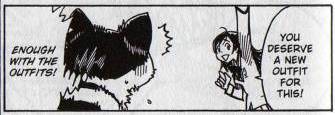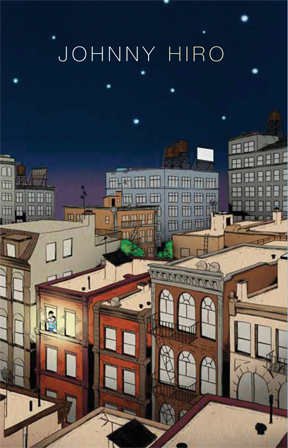
I’m normally not a fan of swapping “tw-” for perfectly good consonants to create an unnecessary new word, but I’ve experienced a feeling I can only describe as “twuilt”: when something someone posts on Twitter shakes you out of your planned, need I add hard-earned, torpor and motivates you to write a manga column after all, even though you were planning on taking the week off.
Anyway, comics-loving librarian Eva Volin noted over the weekend that Yuji Iwahara’s Chikyu Misaki (CMX) is deeply under-appreciated, and while I’d been planning on writing something about Iwahara’s comics eventually, I moved the column ahead in the queue. So it’s now up over at The Comics Reporter.
Since I’m on the subject of the talented Iwahara, how about a poll?
If your favorite hasn’t been licensed yet, feel free to list it in the comments.
 I’ll begin my look at
I’ll begin my look at  With that off my chest, I can look to the future, which includes a new series from Yuji Iwahara,
With that off my chest, I can look to the future, which includes a new series from Yuji Iwahara,  I suspect the impact of its conclusion will be washed away in a sea of Fruits Basket tears, but I’ll also miss
I suspect the impact of its conclusion will be washed away in a sea of Fruits Basket tears, but I’ll also miss  There are some debuts. I quite liked the first volume of Natsuna Kawase’s The Lapis Lazuli Crown (CMX), so I’ll certainly take a chance on
There are some debuts. I quite liked the first volume of Natsuna Kawase’s The Lapis Lazuli Crown (CMX), so I’ll certainly take a chance on  I’ve enjoyed Josh Neufeld’s travel comics, though he tends to go places I would never personally consider for a vacation. My idea of roughing it is hotels with limited room service. But his
I’ve enjoyed Josh Neufeld’s travel comics, though he tends to go places I would never personally consider for a vacation. My idea of roughing it is hotels with limited room service. But his 
 I thought Saika Kunieda’s Future Lovers (Deux Press) was a one-shot, which was pretty much the book’s only disappointing aspect. I was happily mistaken, and
I thought Saika Kunieda’s Future Lovers (Deux Press) was a one-shot, which was pretty much the book’s only disappointing aspect. I was happily mistaken, and